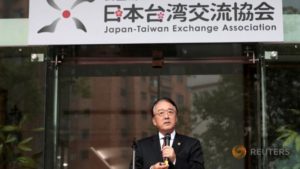by WorldTribune Staff, January 3, 2017
Japan drew angry protests from China after changing the name of its Taiwanese embassy, a move Beijing saw as Tokyo taking a step toward recognizing Taiwan as a separate country.
The name of Japan’s Taiwanese embassy in Taipei was officially changed in a ceremony on Jan. 3 from “The Interchange Association” to “Japan-Taiwan Exchange Association”.

“We firmly oppose any attempt to create ‘two Chinas’ or ‘one China, one Taiwan’, and express strong dissatisfaction with the Japanese side’s negative move,” Chinese Foreign Ministry spokesperson Hua Chunying said in response to the name change.
The embassy had been called “The Interchange Association” since it was set up in the 1970s. Since then, Japan has become Taiwan’s third largest trading partner and second largest source of foreign tourists.
Japan’s move came after Taiwan had sent a blunt message to China by ordering its military forces to prepare to defend threats from China.
Taiwan defense minister Feng Shih-kuan told Taiwan Central News Agency on Dec. 27 that the “enemy’s threats are increasingly expanding” as he issued orders for the military to step up training exercises.
“We must always maintain combat preparedness,” Feng said.
The moves by Japan and Taiwan came shortly after China scaled up its South China Sea campaign. In November, China told Japan’s close ally, the U.S., to stay away from Beijing’s “own” South China Sea.
On Dec. 31, three China Coast Guard vessels entered Japanese waters around the disputed Senkaku Islands in the East China Sea, according to the Japan Coast Guard.
Also last month, Chinese warships that included the country’s only aircraft carrier made their way to the South China Sea after passing south of Taiwan.
In June, China warned Japan “not to send Self-Defense Forces to join U.S. operations that test the freedom of navigation in the disputed South China Sea,” according to a Japan Times editorial.
China has signaled its distrust of newly elected Taiwanese President Tsai Ing-wen and has stepped up pressure on her following a phone call between her and U.S. President-elect Donald Trump.
Trump later cast doubt on the U.S. commitment to the “one China” policy and did not rule out meeting Tsai in future.
China’s Foreign Ministry said there should be no official contacts between the United States and Taiwan.
“The Taiwan issue has always been the most important and sensitive one in relations between China and the United States. We urge the U.S. to fully recognize the sensitivity of the Taiwan issue,” the ministry said.
